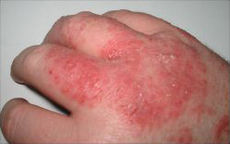Psoriasis and eczema are both debilitating skin problems that cause red skin rashes. Eczema tends to be more related to food allergies and environmental factors. That’s why it can easily be treated with a healthy lifestyle and avoiding specific triggers. It is important to figure out what triggers the break outs and stay away from them.
Psoriasis tends to be a genetic problem and is usually inherited. You can read more about the differences between eczema and psoriasis and the new treatments that are being researched.
Psoriasis and eczema both cause red, scaly skin rashes, but the similarities between the two common, distressing conditions typically end there. And now, examining patients suffering from both ailments (a very rare phenomenon), German scientists have teased out the opposing immune system responses that prompt skin flare-ups for both diseases.
They believe the findings could one day lead to more targeted, effective treatments.
The study, published in the New England Journal of Medicine, evaluated three patients with both psoriasis and eczema and noted that the T-cells – types of white blood cells that fight infection – found in psoriasis lesions differed from those found in eczema lesions.
The findings suggest that these T-cells migrate to the skin in response to distinct environmental triggers, not that the skin cells themselves are abnormal in either inflammatory condition, the study authors said.
“It’s just another way for doctors to understand immune pathways and where they go awry,” explained Dr Doris Day, a dermatologist at Lenox Hill Hospital in New York City, who was not involved in the study. “It puts our understanding exponentially ahead and confuses us at the same time, because it’s not supposed to happen [that patients can have both conditions]. The study definitely has value, and they’re not making any claims or recommendations.”
Click here to visit the original source of this post
Natural skin care tips for eczema suggests using green tea extract to treat the rash and the itching. Just apply to the affected areas couple times a day until the condition improves. It is very important to figure out what triggers the break outs and eliminate it. Most of the time it’s the food or environmental allergies that are the culprit.





